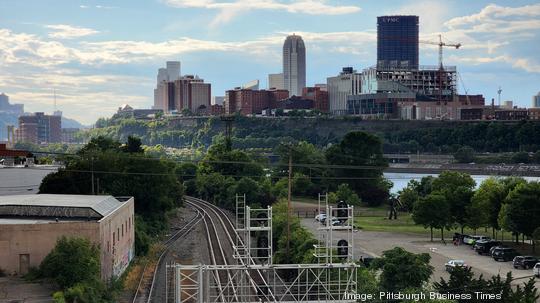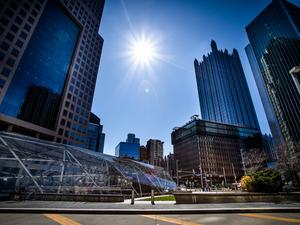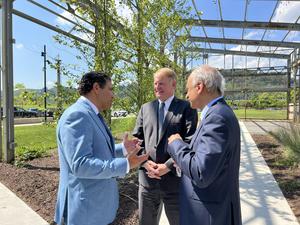
A robotics manufacturing hub. A "startup factory" for budding robotics companies. Expanded job opportunities and resources for those seeking new economy careers or for those looking to become entrepreneurs.
In the next few years, these are just some of the main objectives that will be pursued in the region following its victory in winning $62.7 million in federal funding as part of the Build Back Better Regional Challenge grant award from the U.S. Economic Development Administration on Friday.
The potential this type of funding could bring to the region had been the subject of many conversations held by Pittsburgh's tech and startup community over the past few months. Now, the efforts to make these plans and others a reality begins. The region is just one of 21 locations around the country that won such funding, which saw 529 initial applicants last fall.
These efforts are being spearheaded by the Southwestern Pennsylvania New Economy Collaborative. The collaborative has identified five main projects that will divvy up the total funding allocation for various initiatives aimed at providing long-term opportunities for people, businesses and communities in the region looking to get into the growing robotics and autonomy industries.
The collaborative is chaired by Stefani Pashman, CEO of the Allegheny Conference on Community Development, and Farnam Jahanian, president of Carnegie Mellon University. Its members include labor representatives, educational institutions, workforce and economic development colleagues, businesses and others from around the 11-county region.
Here's a closer look at how the funding will be used:
Expanding pathways for new economy careers
With its $24.8 million allotment of the funds, the Southwestern Pennsylvania Commission has been tasked with establishing a coordinated, regional upskilling system that will serve robotics technology developers and robotics technology adopters in the years to come. This will involve the opening up of a range of training options beyond those of the traditional four-year and advanced degrees. SPC also will ensure that these programs evolve based on industry needs as it looks to connect individuals to education, jobs and opportunity.
SPC will direct this funding to the region's four community colleges, regional higher education partners, workforce development boards, labor partners and industry intermediaries to help facilitate this task.
"The Build Back Better grant aligns seamlessly with the vision, goals and strategies of the region’s long-range plan, SmartMoves for a Changing Region,” Vincent Valdes, SPC executive director, said in an email statement. "Our goal of a globally competitive economy where strategic infrastructure investments and workforce training will make the region recognized as a global leader in technology and innovation focuses on the actions of growing, training and retraining our workforce, making the workforce of the future ready for any and all opportunities that southwestern Pennsylvania can offer. Build Back Better will enable our region to maximize the benefits of this once-in-a-generation funding opportunity and put these actions into motion as soon as possible."
SPC anticipates this funding, combined with that of the other tranches, will lead to the training of 14,000 individuals over 750 regional businesses in southwestern Pennsylvania. For its roles in that training, SPC will establish hubs of "robust training activity" across the region by coordinating with local industry partners and higher education institutions to identify where these hubs should be created.
A robotics manufacturing hub
The Advanced Robotics for Manufacturing Institute picked up $14.2 million as part of the Build Back Better win for the region, which it plans to use for the creation and running of a robotics manufacturing hub out of its offices in the Mill 19 development at Hazelwood Green.
Spanning 30,000 square feet, ARM is looking to offer the space as a de-risking center for local small to midsized manufacturers to come and try various robotics solutions for their current operations. ARM also will offer its technical know-how to those who are looking to come to the space as part of an effort to tap into robotics for their manufacturing needs. For companies without previous in-house expertise, this can help mitigate the risk of jumping into robotics.
"Robots are coming down in price, but they're still pretty pricey," said Jay Douglass, chief operating officer at ARM. "If the manufacturer can come to our hub at Mill 19 and try things out with expertise that we supply and robots that we supply for these experiments, and then could do some economic analysis, maybe we can take the risk out of deploying advanced technology into these factory operations. A small manufacturer can't afford not to look at new solutions. One of those solutions spaces today is the deployment of robotics, and so what we're going to do is take the risk out of making that decision."
In addition to building out the space, funding also will be used to hire technicians to field this experimental robotics playground of sorts. The funds are set to last about four years, at which point Douglass said ARM is hopeful it will be self-sustaining through the manufacturers that are using it.
"It's right in our wheelhouse," Douglass said. "The core mission of the ARM Institute is to improve U.S. manufacturing competitiveness through the use of robotics. This is just a very specific way to do that."
A robotics startup factory
Innovation Works Inc., one of the region's most prolific seed-stage investment firms, has received a $12 million allotment to build a new applied robotics startup factory somewhere within a 10-minute drive of downtown Pittsburgh. A specific location hasn't been set yet, but ensuring it has access to plentiful public transportation options is also a requirement, according to Mike Formica, IW's managing director of hardware and AlphaLab Gear, IW's hardware-based startup accelerator.
The robotics startup factory will consist of three pillars: Formation, launch and growth.
Formation will focus on fostering partnerships between industries, academia and entrepreneurs to determine market needs and develop a minimal viable product.
"We want to bring industry players in from transportation, logistics, construction factories and say, 'look, what are the biggest problems you're facing today,' and then connect them up with entrepreneurs or technologists who are like, 'oh, I can solve that problem,'" Formica said. "The first stage of the startup robotics factory is to bring those industry players to bear, marry them up with the technologists, the research, other companies, whatever the case may be, but the key is we're doing it all preformation."
Then in the launch pillar, one-on-one engagements will be held between industry experts and entrepreneurs to fine-tune the focus on solutions these startups can bring to market. Finally, in the growth pillar, manufacturing assistance will help these founders get their parts made by local manufacturers.
Most, if not all, of these efforts, will take place in a to-be-decided location that Formica said will ideally occupy several thousand square feet of space for a "robot playground" as well as for testing.
"One thing that's really neat about this is the expectation that companies will be generating early stage production out of this facility as well," Formica said. "They'll be developing their product and hopefully shipping out of there. We need to have the ability to bring trucks in to drop off boxes and parts and ship parts back out. It's not going to be the 10th story of some fancy building somewhere because it needs to be a production-, a light-production- but still production-equipped facility."
Other initiatives
InnovatePGH, a public-private partnership based in Oakland that's looking to advance and champion the region's startup scene, received $6.9 million to create "Expanded Pathways to Entrepreneurship," an initiative it will lead.
Catalyst Connection, a local nonprofit organization tasked with helping manufacturers respond to changing markets and technology, will use its $4.8 million allotment to build up an SME Robotics Adoption project that will be used to support technology adoption for small and midsized enterprises.
According to Don Smith Jr., president of the Regional Industrial Development Corporation of Southwestern Pennsylvania, the core of the overall pitch's origin relied heavily on the findings of a joint report published in September 2021 from RIDC and the Greater Pittsburgh Chamber of Commerce that found the Pittsburgh region to be a major player in the global autonomy sector but that "urgent action" was needed by stakeholders to compete against other regions and to encourage autonomous companies to locate and remain in southwestern Pennsylvania. With this funding, Smith is confident the region is now solidly positioning itself to succeed in the future as it builds on the backs of its prior accomplishments in robotics and autonomy.
"It's just great validation for the region and all the investments that we've made in technology development and technology-based economic development," Smith said. "I mean, this is the kind of resource that — in terms of dollars — we haven't had for economic development since maybe the [Gov. Tom] Ridge or [Gov. Ed] Rendell administrations. This is a big infusion in a very targeted way around what we all think is a very prominent opportunity; that's an opportunity that doesn't come along in economic development very, very often."
The national Build Back Better challenge totaled $1 billion in funds that were set aside for grants that could reach up to $100 million, funding for which came as part of the federal American Rescue Plan Act signed into law by President Joe Biden in March 2021.









